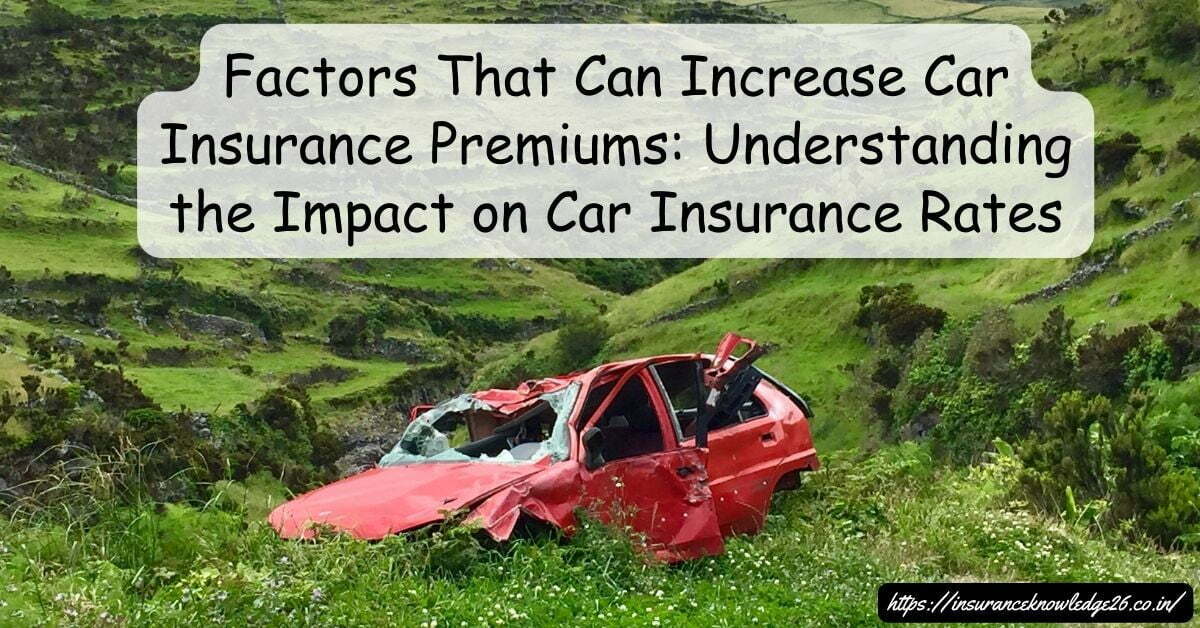Factors That Can Increase Car Insurance Premiums: Understanding the Impact on Car Insurance Rates
Car insurance is a critical aspect of responsible car ownership, providing financial protection against accidents and unforeseen events on the road. When purchasing car insurance, understanding the various factors that can affect your premiums is essential. Insurance companies assess several risk factors to determine policy costs. In this comprehensive guide, we will explore the factors that can increase car insurance premiums and shed light on how these elements impact insurance rates.

1. Age and Driving Experience
Age and driving experience are influential factors in determining car insurance premiums. Younger and inexperienced drivers are statistically more likely to be involved in accidents, making them a higher risk for insurers. As a result, insurance premiums for young and novice drivers tend to be higher than those for older, more experienced drivers.
2. Driving Record
A clean driving record with no accidents or traffic violations is a hallmark of a safe driver. On the other hand, a history of accidents, speeding tickets, or other infractions can significantly impact insurance rates. Drivers with a history of traffic violations are seen as higher-risk clients, leading to higher insurance premiums.
3. Location
Your location plays a crucial role in determining car insurance rates. Urban areas with higher population densities and more traffic tend to have higher insurance premiums due to increased accident risks. Additionally, areas with higher rates of auto theft or vandalism may also incur higher insurance costs.
4. Vehicle Make, Model, and Age
The type of vehicle you drive can influence your insurance premiums. Cars with higher horsepower, sporty models, or luxury vehicles are more expensive to insure due to their increased risk of accidents and higher repair costs. Additionally, older cars may have higher premiums if they lack modern safety features.
5. Annual Mileage
The more you drive, the higher the likelihood of being involved in an accident. Insurance companies consider your annual mileage when calculating premiums. Drivers with long commutes or those who frequently use their vehicles for long trips may face higher insurance costs.
6. Gender
Historically, statistics have shown that young male drivers are involved in more accidents compared to young female drivers. While the gender-based pricing of car insurance is not universal, some insurance companies may consider gender as a factor when setting premiums.

7. Credit Score
In many states, credit scores play a role in determining car insurance premiums. Insurers use credit-based insurance scores to assess risk. Drivers with higher credit scores are considered more responsible and may receive lower insurance rates, while those with lower scores might face higher premiums.
8. Previous Insurance Coverage
A lapse in car insurance coverage can lead to higher premiums when you decide to get insured again. Insurance companies view drivers without continuous coverage as higher risks and may adjust premiums accordingly.
9. Marital Status
Married individuals often receive lower insurance premiums compared to single individuals. Studies have shown that married drivers tend to have fewer accidents, leading insurance companies to offer them more favorable rates.
10. Deductible Amount
The deductible is the amount you pay out of pocket before your insurance coverage kicks in. Opting for a lower deductible can increase your insurance premium because the insurance company will have to cover more costs in the event of a claim.
11. Claims History
The frequency and severity of previous insurance claims can impact future insurance premiums. Drivers who have filed multiple claims in the past are considered higher risk and may face higher insurance rates.
12. Coverage Limits
Increasing your coverage limits beyond the minimum requirements can raise your insurance premiums. While higher coverage limits provide better protection, they come with higher costs.

13. Usage-based Insurance
Usage-based insurance programs monitor your driving behavior, including factors like speed, braking, and mileage. If the data collected indicates risky driving habits, your premiums may increase, but safe driving habits could lead to potential discounts.
14. Additional Drivers
Adding additional drivers to your policy can impact your insurance premiums. Young or inexperienced drivers, especially those with a history of accidents or violations, may increase the overall cost of your policy.
15. Insurance Provider
Each insurance company uses its unique formula to calculate premiums, considering various factors. As a result, the same driver with the same car may receive different quotes from different insurers.
Car insurance premiums are influenced by a variety of factors, some of which are within your control, while others are not. Understanding the factors that can increase car insurance premiums empowers you to make informed decisions and take steps to potentially reduce your rates. As a responsible driver, it is essential to maintain a clean driving record, consider the type of vehicle you drive, and shop around for the best insurance policy that suits your needs and budget. By taking these factors into account, you can strike a balance between adequate coverage and manageable premiums, ensuring peace of mind on the road.
Disclaimer
The information provided in this post is based on general knowledge and may not be up-to-date or applicable to specific insurance products or regulations in your jurisdiction. Insurance policies and regulations can vary widely, so it’s essential to research and verify information with local authorities or insurance providers.

